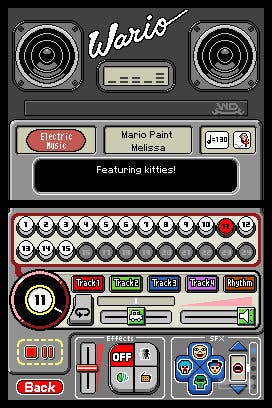WarioWare DIY
Build!
In the case of the tutorial game, this meant, "If you touch the ladybird, make it wander off-screen", but it could just as easily be, "If you punch the robot, make it explode," or, "If you hit the glowing weak spot, do massive damage." Options are chosen from a list, and pretty soon you'll discover that you can get really complex behaviours going, setting objects on certain paths, assigning sound effects, and creating convoluted branching rules.
After all that, the final stage saw me returning to the AI editor once again to specify win conditions: ensuring for this example that when the ladybird moves off the screen, the player has completed the game successfully. Job done. On the way home, Infinity Ward rang up to offer me a job. The studio had some unexpected vacancies, apparently.
As a whole, DIY's looking like a lovely piece of work: a system that allows you access to some quite complex stuff, while making sure that you're never overwhelmed. A certain fiddliness is baked into game design, however - even if you don't have Peter Molyneux hanging around saying things like, "What if the swords could really talk?" - and while WarioWare's designers ensure that you're never more than a button away from the ability to test out what you've built so far, it's still going to take a lot of effort, and a lot of plodding through tutorials, to get the most out of it.

What's more, as LittleBigPlanet has proved, making the software is only half the battle: you still can't be sure until the day of release that people are going to use it. In this regard, though, DIY shouldn't have too much to worry about. Media Molecule's game may not have that many creators, but they're fiercely productive, ensuring a steady stream of new content for those who are happy to just spectate. Not only does DIY come with a solid suite of "proper" micro-games already installed, it will allow you to download new ones from the community fairly easily, while an additional WiiWare offering will let you then play them on the telly if you've already got the DS cartridge.
All of this is just skimming the surface, of course. A quick spin through the menus suggests that there's a kind of mission structure to the game itself, casting you as a freelance game designer completing projects for WarioWare's extended cast, along with plenty of ways to package your separate games together into actual rounds via the game blender, a cute visual means of keeping track of your saved projects, each with its own cartridge and label, and even the option to make standalone songs and four-panel comics.
It's a generous package, then, even if you aren't going to build anything. Beyond that, it's tempting to suggest that, if anybody was going to make a concept as tricky as this work, it would be Intelligent Systems. After all, they've been engaged in the complex business of keeping things simple for years.









